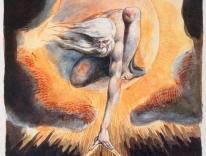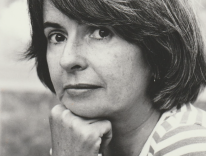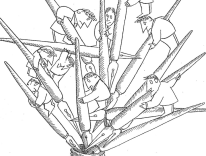The book jacket of the recently reissued, Crusoes Daughter, asserts that the author Jane Gardam is the best British novelist you never heard of. This is a fair comment in that Gardam has published eighteen works of fiction (and three childrens books) to critical acclaim, but she has a small following in this country. The question should be not why so many American readers have missed her but rather what have they missed. Much, clearly. Gardams works stand quite happily next to those of her rough contemporaries, Penelope Fitzgerald and Beryl Bainbridge. She shares with them an acute sense of social class, the ability to summon up the not too distant past, and a quirky inventiveness in plot development. Her style is effortless and laconic.Crusoes Daughter, an early work, introduces the themes that preoccupy the writer, eccentricity of character, the force of religious belief, and profoundly ironic movements toward self-discovery and acceptance. Her characters appear stripped down by fate, sometimes harshly, sometime through slow processes of family or professional demands. However conventional their stations or professions, their lives are always unconventional. Polly Flint, the daughter of Crusoe of the title, is abruptly orphaned and finds herself living with her maiden aunts in a rambling old yellow house abutting the German Sea on the coast of Yorkshire. The late Victorian setting brackets the child with idiosyncratic, no, down-right odd, maiden aunts whose religious fervor forces both observance and precocious sensibility on their niece. The tale is complex and focuses on the time of the First World War, with all its attendant losses and displacements.Polly narrates the tale with the hindsight of some fifty years in time. The perspective alters with Pollys age and psychological state, yet it is to Gardams great credit that we never lose the sense that we are listening to an aged voice, adapting in memory to childhood impressions, alcoholic depression and romantic frustrations. The narrative form changes accordingly: her letters to her aunt carry the account of her first meeting with a wider, artistic world just as the concluding play for voices offers a magical resolution to her relationship with her fictional father.If we take the title at face value, Polly is, in some sense like Crusoe, a castaway: isolated, self-dependent, and struggling to master the environment she inhabits. Too often it appears that people create the environment that challenges her. Yet it is Crusoes moral temper that she so deeply imbibes and defends against those who would dismiss Defoes novel as prosaic or childish. Crusoe is the moral standard against which she measures herself and by whom she finally stands approved.It is impossible to convey by quotation the delicacy and wit of the characterization, and the disarming self-revelation of the chief character. Her eccentric family and larger than life neighbors are rendered, as it were, from the Crusoe perspective: a wariness that is won over by staunch weighing of danger and strength. Uncle Thwaite has an elliptical warmth in speech and appearance that begs all indulgence, which Polly indeed gives. The Vicars Alice, who arrives a necessary helpmate, offers her a mirror of Crusoe-like organization and resourcefulness. It is Alice who steels Pollys character when she is in danger of abandoning herself to whiskey and helps Polly become the teacher that we all wish we had (or were). There is nothing sentimental in Gardams world; death and old age make their stark claims, and the conclusion shows that Polly, who locks herself away in her singular battle with memory, is as realistic with herself in judgment as was her favorite character.Gardams range is considerable. Her recent works, Old Filth and The Man in the Wooden Hat take us far away in place (Hong Kong) but we dwell there only to return to familiar territory: rural England and challengingly old eccentrics ones whose memories constantly taunt them to honesty and affirmation of life. She is a rare novelist, but too few of her works are available here. We can be thankful that Europa press is publishing her novels in this country and can hope only that they fill out their list with all her titles.


